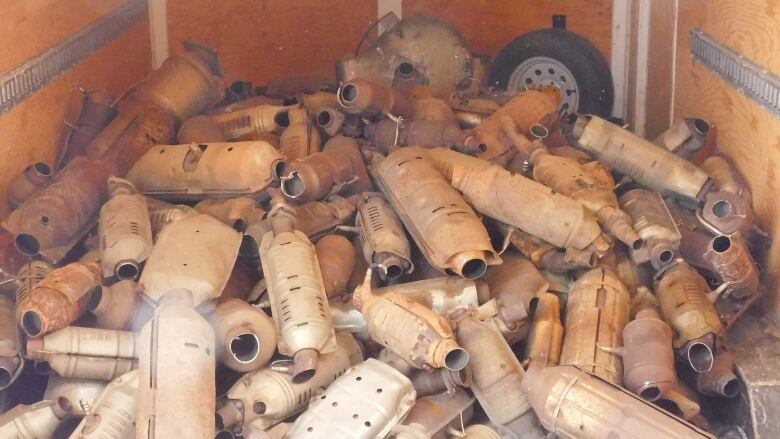Alberta's proposed Bill 25 aims to crack down on sellers of stolen metal
Charges laid against Edmonton man with 462 stolen catalytic converters in his trailer

The Alberta government introduced legislation Thursdaythat would require scrap metal dealers to report to police all transactions involving commonly stolen metals and items such as catalytic converters.
Bill 25, theProtecting Alberta Industry from Theft Act, 2020, was tabled hours after Edmonton police released details about the arrest of a man caught with 462 stolencatalytic converters.
If passed, the legislation would make it harder for criminals to sell stolen goods and impose tougher penalties on those who do, the government said in a news release.
"Thieves terrify property and business owners by trespassing and stealing materials such as copper wire and industrial batteries, and frequently damage and interfere with critical systems like electrical lines, telecommunications networks and transportation infrastructure," the news release said.
To combatmetal theft, the government proclaimed theScrap Metal Dealers and Recyclers Identification Act in the fall of 2019. The bill passed in 2013 but previous governments never brought into force.
On Thursday, Edmonton police said a local man who was pulling a storage trailer filled with 462 stolen has been charged in connection with a major ring involving the theft and sale of the valuable auto parts.
The June 11 arrest ended a four-month investigation, which began when police became aware of multiple people cutting catalytic converters off vehicles and selling them to the 24 year old, police said in a news release.
"This individual was preying on people who have been struggling to stay afloat financially right now, many of whom have been laid off or out of work as a result of COVID-19," Staff Sgt. Steven Chwok said in the release.
Converters are part of a vehicle's exhaust system, converting pollutants to less toxic material before they're expelled. The part is targeted because it contains high-value metals, which are then sold at scrap metal yards.
Through the course of the investigation, police observed meetings in back alleys and parking lots where people were seen placing catalytic converters or duffelbags suspected of containing them into trucks driven by the man who was later charged.
That led them to a northeast Edmonton "stash pad,"a storage locker where the converters were being stored before being sold to recyclers, police said.
The man was arrested on June 11 while driving west on Highway 16 toward Spruce Grove. The trailer he was pulling contained 462 catalytic converters, which would have been worth about $300,000 when sold for scrap.
With an average cost of about $2,000 to replace and repair the damage, the total cost to vehicle owners would be more than $900,000, police said in the release.
"The investigating members are well aware of the financial burden citizens have experienced replacing these converters on their vehicles," said Chwok.
Since February, 756 catalytic converters have been stolen from vehicles in Edmonton, police said. More than 1,000 such thefts have been reported to police since October.
A 24-year-old Edmonton man has been charged with trafficking stolen property, possession of stolen property for the purpose of trafficking, possession of property obtained by crime and money laundering.
If Bill 25 becomes law,the new provisions would be implemented in two stages to give stakeholders time to adjust and comply.
On Sept. 1, new provisions would include a requirement for sellers to provide government-issued photo ID. Dealers would be required to record and retain the seller's ID information, as well as details of the transaction.
On Nov. 1, additional provisions would include requirements for dealers to report transactions to law enforcement and for all payments to be made using traceable forms of currency, such as electronic transfers or cheques.
The proposed legislation includes increased fines:
- For individuals, the penalty for afirst offence would be a $10,000 fine or one year in jail, or both (up from $5,000). The fine for second or subsequent offences would be $25,000 or one year in jail, or both (up from $15,000).
For corporations the fine for a first offence would be$50,000 (up from $15,000) and for second or subsequent offences the fine would be$200,000 (up from $50,000).












_(720p).jpg)


 OFFICIAL HD MUSIC VIDEO.jpg)
.jpg)



























































































